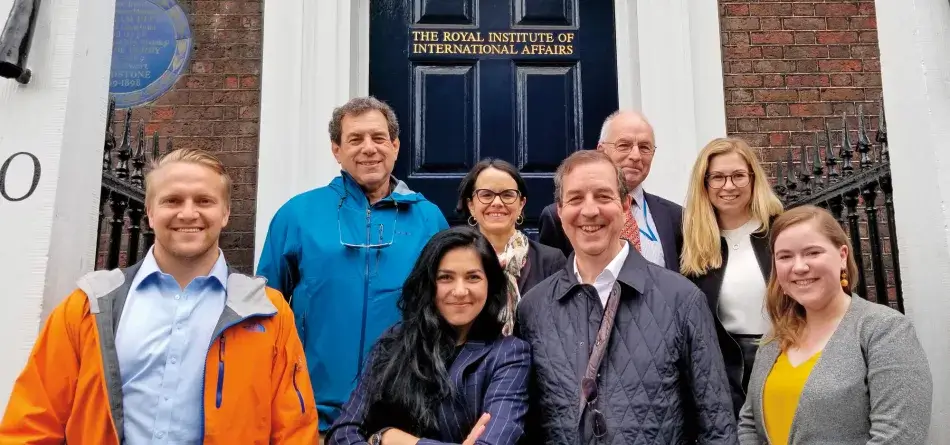Global Security and International Affairs
The Global Security and International Affairs program area draws on the expertise of policy-makers, practitioners, and scholars to foster knowledge and inform innovative and more sustainable policies to address crucial issues affecting a global community. Projects underway in this area engage with pressing strategic, development, and moral questions that underpin relations among people, communities, and states worldwide. Each initiative embraces a broad conception of security as the interaction among human, national, and global security imperatives. Project recommendations move beyond the idea of security as the absence of war toward higher aspirations of collective peace, development, and justice.
Committee on International Security Studies
CHAIR
Scott D. Sagan
Stanford University
MEMBERS
Nicholas Burns
Harvard University
Antonia Chayes
Tufts University
Christopher Chyba
Princeton University
Karl Eikenberry
Stanford University
Tanisha Fazal
University of Minnesota
Martha Finnemore
George Washington University
Robert Legvold
Columbia University
Rose McDermott
Brown University
Steven E. Miller
Harvard University
Barry Posen
Massachusetts Institute of Technology
Adam Roberts
University of Oxford
Kathryn Sikkink
Harvard University
Paul Wise
Stanford University
Project
Meeting the Challenges of the New Nuclear Age, Phase One
The global nuclear order is evolving today along three main dimensions: 1) the nuclear posture of several nuclear weapons states has changed because of the possible use of nuclear weapons in war fighting; 2) technological innovations (in the space and cyber realm in particular, although not exclusively) are impacting existing nuclear arrangements (including the extended deterrence architecture and strategic stability); and 3) the changes in the current global nuclear order affect the prospects for nuclear arms control in a multipolar world.
Phase one of the project will identify the major dangers generated by the dynamics of a multipolar nuclear world–dangers that pose the greatest threat of inadvertent nuclear war; offer alternative approaches to addressing each of these dangers and then facilitate discussions with relevant communities in the United States and abroad; and encourage and assist policy-makers, Congress, the analytical community, and the media to think systematically about a world that is now multipolar. The project has published three research papers that have been shared with diverse audiences, such as domestic and international policy-makers, scholars and students of nuclear affairs, and leaders of international organizations. In Spring 2020, the project will publish an issue of Dædalus, which will be accompanied by an outreach strategy targeting relevant policy-makers and academics.
Meeting the Challenges of the New Nuclear Age is rooted in the critically important work on arms control that the Academy conducted from 1958 to 1960 to prevent a nuclear confrontation between the United States and the Soviet Union. During that time Academy Fellows gathered monthly to build a cooperative framework between the United States and the Soviet Union based on the limitations of the nuclear stockpile and the establishment of mutual vulnerability between the two rivals. The group included Donald Brennan, Edward Teller, Henry Kissinger, and Thomas Schelling, among others.
PROJECT CHAIRS
Robert Legvold
Columbia University
Christopher Chyba
Princeton University
STEERING COMMITTEE MEMBERS
Thomas J. Christensen
Princeton University
Lynn Eden
Stanford University
Steven E. Miller
Harvard Kennedy School
Janne Nolan†
George Washington University
Scott D. Sagan
Stanford University
Jon Wolfsthal
Nuclear Crisis Group
WORKING GROUP MEMBERS
James M. Acton
Carnegie Endowment for International Peace
Mark Bell
University of Minnesota
Linton Brooks
Center for Strategic and International Studies; formerly, U.S. Department of Energy and U.S. National Nuclear Security Administration
M. Taylor Fravel
Massachusetts Institute of Technology
Sumit Ganguly
Indiana University, Bloomington
Francis J. Gavin
Johns Hopkins School of Advanced and International Studies
Michael Krepon
Stimson Center
Hans Kristensen
Federation of American Scientists
Jessica Tuchman Mathews
Carnegie Endowment for International Peace
Nicholas Miller
Dartmouth College
Steven E. Miller
Harvard University
Vipin Narang
Massachusetts Institute of Technology
Janne Nolan†
George Washington University
Olga Oliker
International Crisis Group; formerly, Center for Strategic and International Studies
George Perkovich
Carnegie Endowment for International Peace
Steven Pifer
Brookings Institution: formerly, U.S. Department of State
William Potter
James Martin Center for Nonproliferation Studies, Middlebury Institute of International Studies at Monterey
Mira Rapp-Hooper
Yale Law School
Scott D. Sagan
Stanford University
Michael Swaine
Carnegie Endowment for International Peace
Nina Tannenwald
Brown University
Jane Vaynman
Temple University
Keren Yarhi-Milo
Princeton University
PROJECT STAFF
Francesca Giovannini
Kathryn Moffat
Brendan Roach
FUNDERS
Louise Henry Bryson and John E. Bryson
John F. Cogan, Jr.
Lester Crown
Alan M. Dachs
Bob and Kristine Higgins
Richard Rosenberg
Kenneth L. and Susan S. Wallach
† Deceased
Project Publications
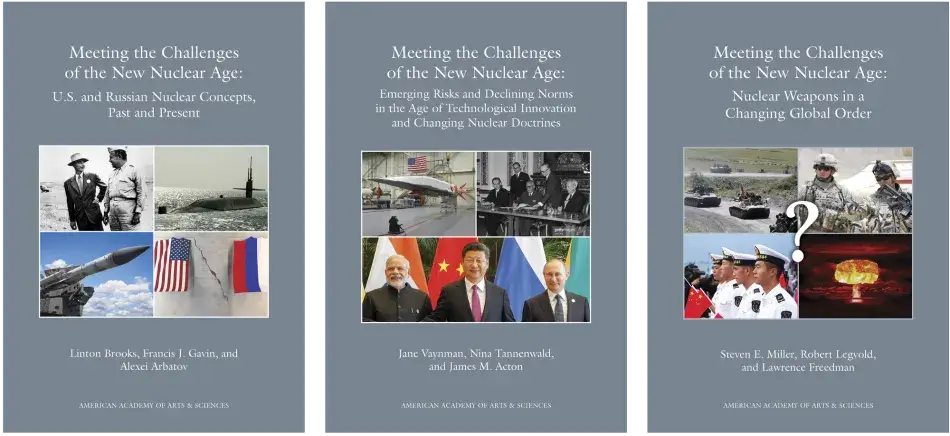
Meeting the Challenges of the New Nuclear Age: U.S. and Russian Nuclear Concepts, Past and Present
Linton Brooks, Alexei Arbatov, and Francis J. Gavin (American Academy of Arts and Sciences, 2018)
Meeting the Challenges of the New Nuclear Age: Emerging Risks and Declining Norms in the Age of Technological Innovation and Changing
Nuclear Doctrines
Nina Tannenwald and James M. Acton, with an Introduction by Jane Vaynman (American Academy of Arts and Sciences, 2018)
Meeting the Challenges of the New Nuclear Age: Nuclear Weapons in a Changing Global Order
Steven E. Miller, Robert Legvold, and Lawrence Freedman (American Academy of Arts and Sciences, 2019)
Project Meetings
Strategic Stability Working Group Meeting
October 31–November 1, 2018
Carnegie Endowment for International Peace
Washington, D.C.
This meeting brought together a group of scholars and current and former policy-makers to examine whether strategic stability is still relevant and viable in a multipolar nuclear world, and its role in the trilateral relationships between the United States, Russia, and China and India, Pakistan, and China.
MEETING CHAIRS
Robert Legvold
Columbia University
Christopher Chyba
Princeton University
Dædalus Authors’ Meeting
February 14–15, 2019
House the Academy
Cambridge, MA
Contributors to the Dædalus issue on “Meeting the Challenges of the New Nuclear Age” discussed drafts of their essays and identified key themes in the volume.
MEETING CHAIRS
Robert Legvold
Columbia University
Christopher Chyba
Princeton University
Dædalus Authors’ Workshop
June 9–11, 2019
House of the Academy
Cambridge, MA
Authors in the Dædalus issue shared feedback on revised versions of their essays and discussed some of the key ideas from the project that will inform the outreach phase of the project.
MEETING CHAIRS
Robert Legvold
Columbia University
Christopher Chyba
Princeton University

Project
Meeting the Challenges of the New Nuclear Age, Phase Two: Deterrence and New Nuclear States
Phase two of Meeting the Challenges of the New Nuclear Age will produce an edited volume of innovative and policy-relevant essays on challenges created by the emergence of “new” nuclear weapons states such as North Korea, and potential proliferators, such as Iran, Saudi Arabia, Japan, South Korea, and Turkey, among others. The study will also explore other nuclear weapons states, including India, Pakistan, and Israel. These states are de facto nuclear weapons states but operate outside of any established multilateral nuclear frameworks such as the Nuclear Non-Proliferation Treaty and the Nuclear Suppliers Group. Deterrence and New Nuclear States would investigate deterrence and defense implications facing small nuclear force-countries and potential proliferators. The study will focus more on regional and sub-regional nuclear dynamics that could further destabilize an already undermined nuclear order.
The edited volume will be published by a university press and will be accompanied by outreach activities aimed at nuclear policy-makers (primarily in the United States) and academic centers and think tank institutes with a specific focus on nuclear studies.
PROJECT CHAIRS
Scott D. Sagan
Stanford University
Vipin Narang
Massachusetts Institute of Technology
ADVISORY COMMITTEE
Victor Cha
Georgetown University
Lawrence Freedman
King’s College London
Robert Jervis
Columbia University
Jeffrey Lewis
Middlebury Institute of International Studies at Monterey
Austin Long
U.S. Department of Defense
Rose McDermott
Brown University
Barry Posen
Massachusetts Institute of Technology
Gary Samore
Brandeis University
Caitlin Talmadge
Georgetown University
PROJECT STAFF
Francesca Giovannini
Kathryn Moffat
Brendan Roach
FUNDERS
Louise Henry Bryson and John E. Bryson
John F. Cogan, Jr.
Lester Crown
Alan M. Dachs
Bob and Kristine Higgins
Richard Rosenberg
Kenneth L. and Susan S. Wallach
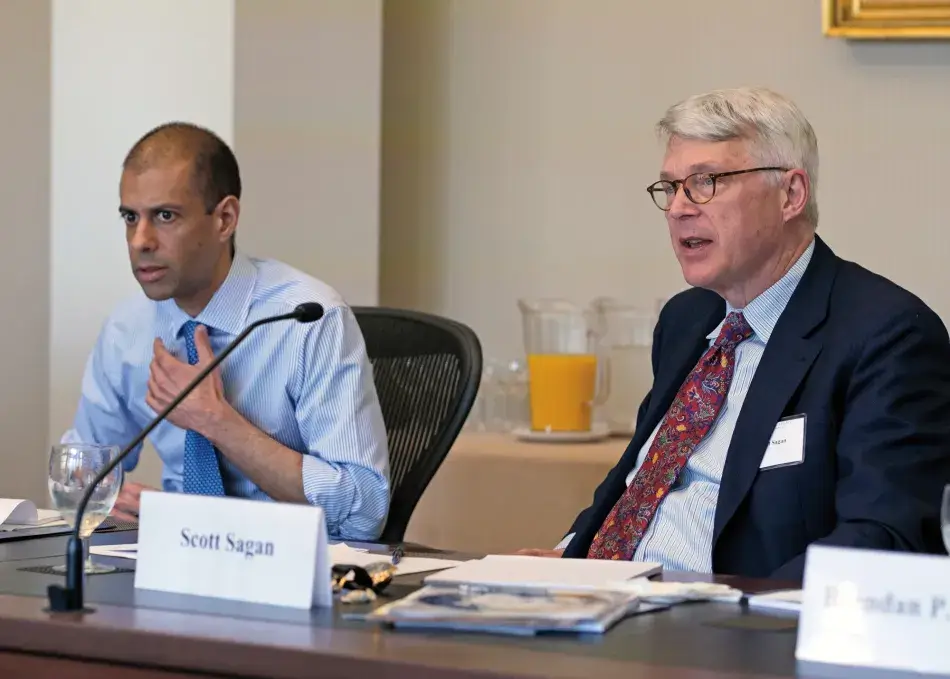
Project Meetings
Deterrence and New Nuclear States Exploratory Meeting
April 24, 2019
House of the Academy
Cambridge, MA
Members of the project’s advisory group met to identify some of the key issues concerning deterrence and new nuclear states that will be addressed in the project’s forthcoming edited volume. Topics of discussion included nuclear testing and breakout, strategic stability and credible deterrence, the psychology of deterrence, and nuclear doctrine and international law.
MEETING CHAIRS
Scott D. Sagan
Stanford University
Vipin Narang
Massachusetts Institute of Technology
KEYNOTE SPEAKERS
Francesca Giovannini
American Academy of Arts and Sciences; Comprehensive Nuclear-Test-Ban Treaty Organization
Barry Posen
Massachusetts Institute of Technology
Gary Samore
Brandeis University
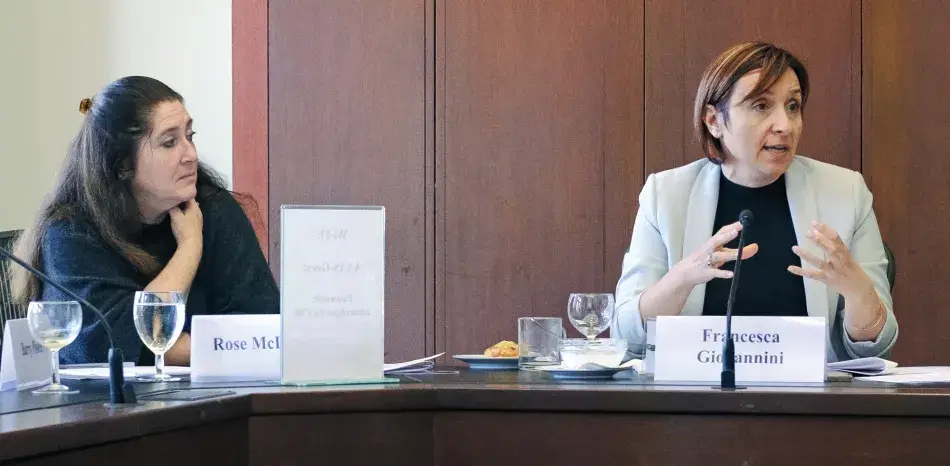
Project
The Global Nuclear Future
The Global Nuclear Future is an interdisciplinary and multinational project that has engaged nuclear newcomers in conversations on nuclear safety, security, and nonproliferation.
The project has focused its work in three main areas: 1) developing regional networks of knowledge in Southeast Asia and the Middle East that could assist nuclear newcomers and nuclear aspirant countries in establishing a safe, secure, and proliferation-resistant program; 2) identifying the best strategies and policies to manage the nuclear fuel cycle, including the back-end of the nuclear fuel cycle and the transfer and governance of dual-use technology; and 3) articulating possible strategies to minimize the risks of insider threats within nuclear laboratories and power plants. The project has convened nuclear experts and scholars to promote dialogue among regional stakeholders; hosted policy briefings and consultations with government officials and representatives of the nuclear industry; and commissioned papers and publications, often co-authored by regional experts, to enhance academic cooperation and nurture interstate intellectual exchanges.
The project has published fourteen research papers, an edited book, and two issues of Dædalus. Its most recent publications include Governance of Dual-Use Technologies: Theory and Practice; A Worst Practices Guide to Insider Threats: Lessons from Past Mistakes; and The Back-End of the Nuclear Fuel Cycle: An Innovative Storage Concept.
PROJECT CHAIRS
Steven Miller
Harvard University
Robert Rosner
University of Chicago
SENIOR ADVISOR
Scott D. Sagan
Stanford University
PROJECT STAFF
Francesca Giovannini
Kathryn Moffat
FUNDERS
Carnegie Corporation of New York
The Flora Family Foundation
The William and Flora Hewlett Foundation
The Kavli Foundation
The John D. and Catherine T. MacArthur Foundation
The Alfred P. Sloan Foundation
Select Project Publications
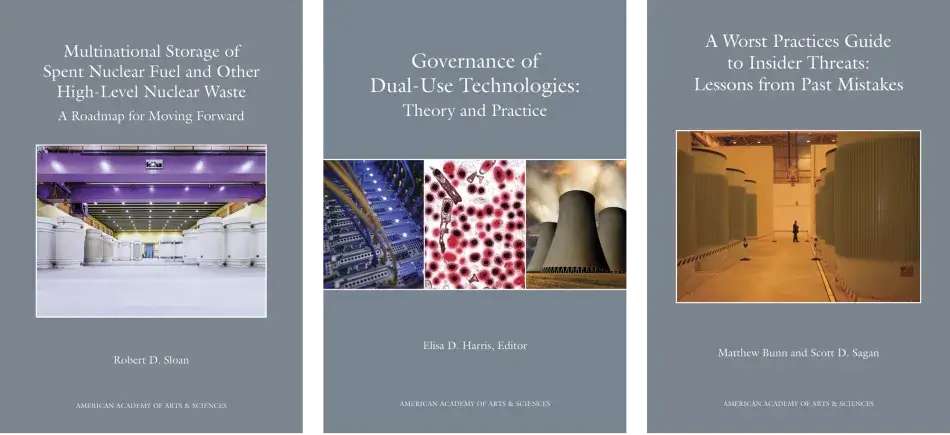
Multinational Storage of Spent Nuclear Fuel and Other High-Level Nuclear Waste: A Roadmap for Moving Forward
Robert D. Sloan (American Academy of Arts and Sciences, 2017)
Governance of Dual-Use Technologies: Theory and Practice
Elisa D. Harris, editor (American Academy of Arts and Sciences, 2016)
A Worst Practices Guide to Insider Threats: Lessons from Past Mistakes
Matthew Bunn and Scott D. Sagan (American Academy of Arts and Sciences, 2014)
Project
Civil Wars, Violence, and International Responses
The Civil Wars, Violence, and International Responses project stems from the observation that current multilateral approaches for preventing, mitigating, and resolving civil wars and intrastate violence are often far too ambitious. They frequently overpromise stability, security, peace, democracy, and development to countries experiencing high levels of violence and instability. To identify the main drivers of civil wars and their security spillover effects, the project published two issues of Dædalus (“Civil Wars & Global Disorder: Threats & Opportunities” and “Ending Civil Wars: Constraints & Possibilities”) with contributions from scholars, former diplomats, military experts, and policy-makers. The project identified six threats that emerge from civil wars and intrastate violence: pandemic diseases, transnational terrorism, migration, regional instability, great power conflict, and criminality. The project has engaged in extensive domestic and international outreach to share findings and recommendations that deliver a more comprehensive, effective, and integrated approach to conflict prevention and crisis management, which encompasses security, diplomacy, and development strategies in countries such as Colombia, Nigeria, Ethiopia, Syria, Lebanon, and Sri Lanka, among others. Building on these policy discussions, the project will publish a research paper focused on the policy implications of the project’s findings, which will be distributed to relevant policy-makers in the United States and internationally.
PROJECT CHAIRS
Karl Eikenberry
Stanford University; U.S. Army, ret.
Stephen Krasner
Stanford University
PROJECT MEMBERS
Michele Barry
Stanford University
Abdeta D. Beyene
Centre for Dialogue, Research, and Cooperation, Ethiopia
Stephen D. Biddle
Columbia University
Tanja A. Börzel
Freie Universität Berlin
Charles Call
American University
Susanna Campbell
American University
Martha Crenshaw
Stanford University
Lyse Doucet
BBC News
Tanisha Fazal
University of Minnesota
James Fearon
Stanford University
Vanda Felbab-Brown
Brookings Institution
Francis Fukuyama
Stanford University
Sumit Ganguly
Indiana University
Miguel García-Sánchez
Universidad de los Andes, Colombia
Richard Gowan
New York University
Sonja Grimm
University of Konstanz, Germany
Jean-Marie Guéhenno
International Crisis Group
Joseph Hewitt
United States Institute of Peace
Stephen Heydemann
Smith College
Bruce Jones
Brookings Institution
Stathis Kalyvas
Yale University
Nancy Lindborg
United States Institute of Peace
Sarah Kenyon Lischer
Wake Forest University
Clare Lockhart
Institute for State Effectiveness
Aila M. Matanock
University of California, Berkeley
Seyoum Mesfin
Institute for Advanced Research, Ethiopia
Stewart Patrick
Council on Foreign Relations
Barry Posen
Massachusetts Institute of Technology
William Reno
Northwestern University
Thomas Risse
Freie Universität Berlin
Hendrik Spruyt
Northwestern University
Stephen Stedman
Stanford University
Eric Stollenwerk
Freie Universität Berlin
Paul H. Wise
Stanford University
PROJECT STAFF
Francesca Giovannini
Kathryn Moffat
Summers Hammel
FUNDERS
Humanity United
The Smith Richardson Foundation
The Oak Foundation
Project Publications
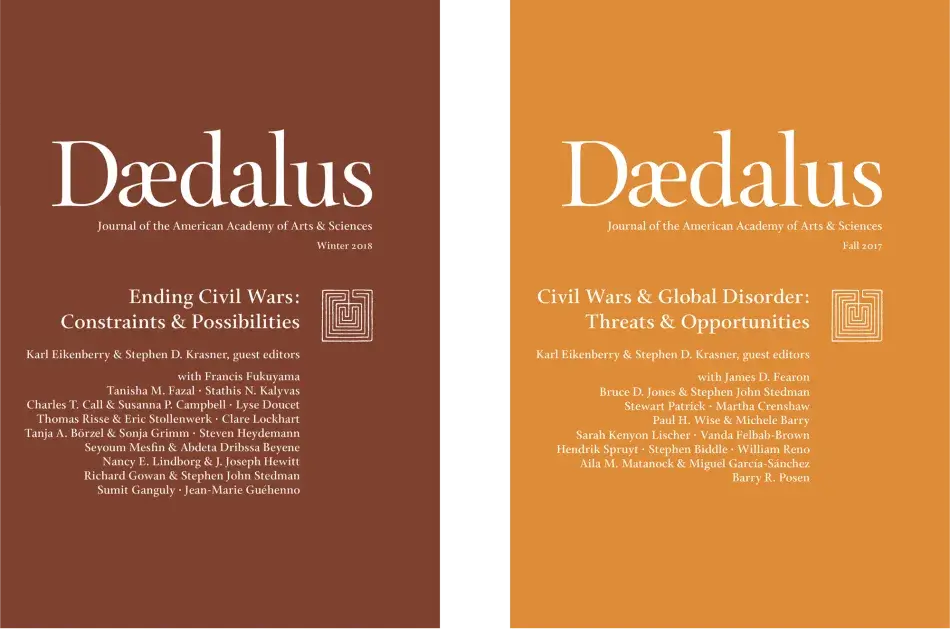
“Ending Civil Wars: Constraints & Possibilities,” Dædalus
edited by Karl Eikenberry & Stephen D. Krasner (2018)
“Civil Wars & Global Disorder: Threats & Opportunities,” Dædalus
edited by Karl Eikenberry & Stephen D. Krasner (2017)
Project Meetings
Civil Wars, Intrastate Violence, and International Responses
October 22–23, 2018
Peking University
Beijing, China
Organized in collaboration with the U.S.–Asia Security Initiative at Stanford University’s Walter H. Shorenstein Asia-Pacific Research Center and the School for International Studies at Peking University, this workshop convened thirty-five experts from China, the United States, Ethiopia, and France to discuss intrastate violence and the limits and possibilities of intervention. Some of the topics that were discussed included the degree to which intrastate violence is rooted in domestic versus international factors, the types of global security threats that such violence creates, and the policy options available to the international community or to regional powers.
MEETING CHAIRS
Karl Eikenberry
Stanford University
Stephen Krasner
Stanford University
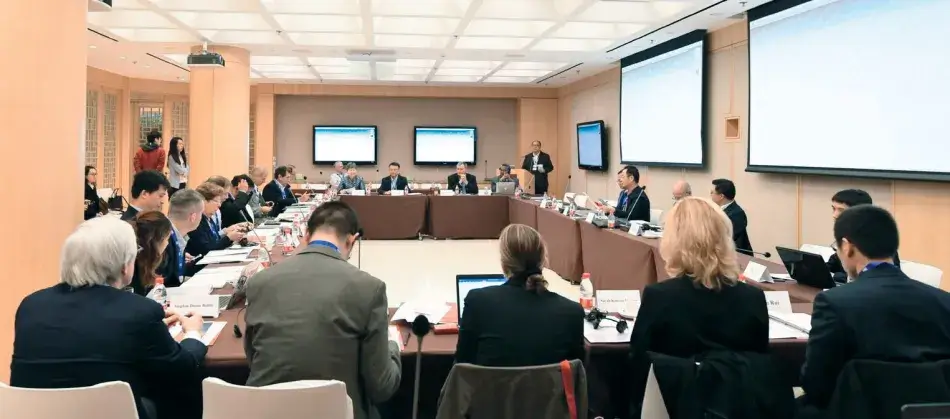
Project
Rethinking the Humanitarian Health Response to Violent Conflict
Rethinking the Humanitarian Health Response to Violent Conflict seeks to understand and address current trends in humanitarian contexts that pose new or changing challenges for humanitarian health responders, including the increasingly protracted nature of civil and non-international armed conflict, the fact that many of the world’s most violent places are facing criminal or political violence rather than conflict as conventionally understood, shortfalls in funding, and changing geopolitical relations. This project will bring together political scientists, legal and security experts, health professionals, and humanitarians to examine current challenges to effective humanitarian action and to develop, where necessary, new strategies for preventing civilian harm and delivering critical health services in areas plagued by violent conflict.
The initiative will consist of an ongoing engagement strategy designed to involve domestic and international policy-maker, practitioner, and scholarly audiences, including international organizations and nongovernmental organizations, to help define new strategies for the effective provision of essential health services in areas of armed violence. By working with key audiences and organizations from the earliest stages, the project will help ensure that its research findings are directly relevant for key actors in this field.
Throughout this initiative, the Academy will seek opportunities to develop partnerships that will guide a range of specialized outputs tailored for specific audiences. Building on the models successfully used by previous Academy projects, this initiative will carry out its work through a mix of convenings, events, and publications. Primary products of the initiative will include a series of publications, such as peer-reviewed journal articles, white papers, and short policy briefs directed at specific audience segments, as well as a series of meetings involving key scholars, practitioners, and others actively concerned with the humanitarian health response to violence. The project will also generate public-facing blog posts, online videos, podcast episodes, and op-eds to reach not only a general audience but also local and field-based humanitarian health providers who may be beyond the reach of targeted project engagement. These efforts will include partnering with universities in the global South and particularly in conflict-affected countries.
PROJECT CHAIRS
Jaime Sepulveda
University of California, San Francisco
Jennifer Welsh
McGill University
Paul Wise
Stanford University
PROJECT STAFF
Francesca Giovannini
Kathryn Moffat
Rebecca Tiernan
Project Meetings
Exploratory Meeting: Rethinking the Humanitarian Health Response to Violent Conflict
January 23–24, 2019
House of the Academy
Cambridge, MA
Building on prior small-group consultations with a variety of experts, this exploratory discussion convened scholars, policy-makers, and practitioners from a variety of disciplines to consider how the Academy could make important and pragmatic contributions to the development of more effective humanitarian health responses in areas of violent conflict.
MEETING CHAIRS
Jennifer Welsh
McGill University
Paul Wise
Stanford University
SPEAKERS
Michael Barnett
The George Washington University
Anne Patterson
Yale University; formerly, U.S. Department of State
Ron Waldman
The George Washington University
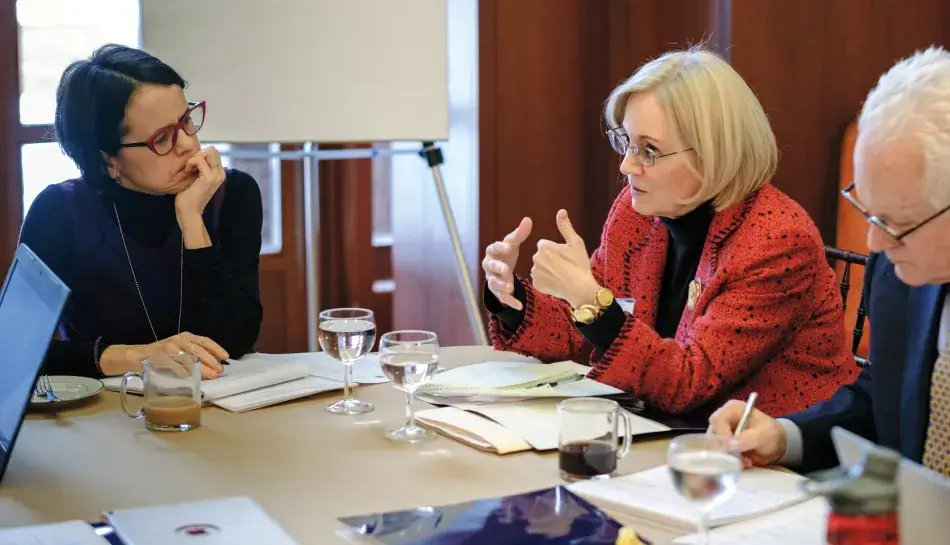
Exploratory Meeting: Rethinking the Humanitarian Health Response to Violent Conflict
June 10–11, 2019
Chatham House
London, United Kingdom
Held in collaboration with the Centre for Global Health Security at Chatham House and the London School of Hygiene and Tropical Medicine, the meeting brought together scholars, practitioners, and policy-makers from the global health, humanitarian, and security sectors to explore how future work by the three hosting organizations could help define new strategies for the provision of essential health services in areas of violent conflict.
MEETING CHAIRS
Rita Dayoub
Chatham House
David Heymann
Chatham House
Jaime Sepulveda
University of California, San Francisco
Neha Singh
London School of Hygiene and Tropical Medicine
Jennifer Welsh
McGill University
Paul Wise
Stanford University
